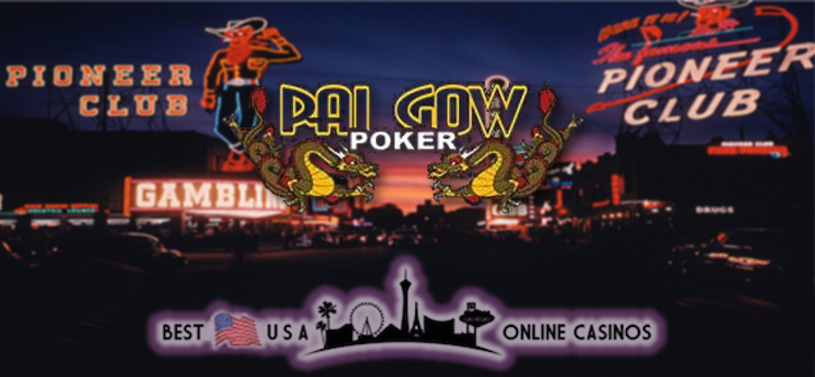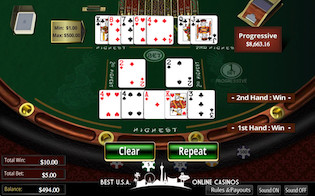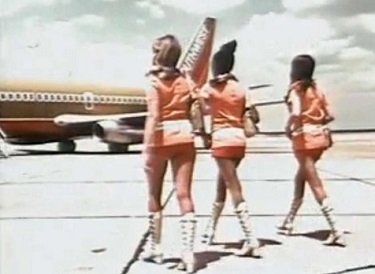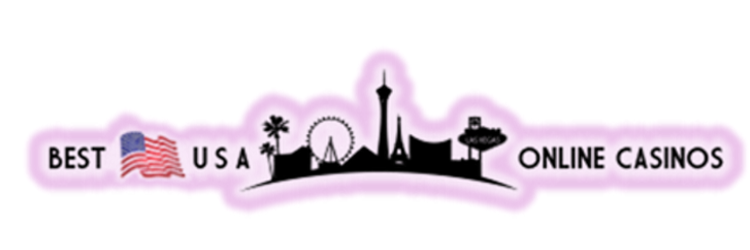
***Updated: November 18th, 2020***
For decades, fans of Pai Gow Poker were forced to venture to brick and mortar establishments in Las Vegas or Atlantic City to find their favorite game. Nowadays, simulated cards fly over virtual tables on iPhones, iPads, and desktop computers throughout the country, enabling access from anywhere at anytime.
Consequently, here are the current rankings for Best Pai Gow USA Online Casinos
as rated by players and staff, updated for winter 2020. Each destination has proven themselves to be honest and trustworthy, some for more than 20 years, others quickly winning over customers via transparent business practices and excellent customer service.
Every site above shares a few things in common: excellent reputation, speedy payouts, big deposit bonuses, and secure software. All have been fully vetted and hold official iGaming licences from various jurisdictions around the world and are regularly audited by independent companies to ensure fairness.
Rules
Players compete against the banker, which may be the House or rotate among participants, depending on location. Pai Gow is dealt from a 53-card deck making it one of only a few games using a Joker, acting as a fifth Ace except when it can be used to complete a flush or a straight.
Everyone receives seven cards to form a five and two card hand, with the result of the five always having to be better. For example, a pair of Aces must be used for two-card hands if the other five create at least two pairs.
Pro Tip: Try this free Pai Gow software courtesy of Nucleus Gaming and the generous folks at legal American MyBookie Casino to practice decision-making and learn various strategies.
After all participants have acted, the banker creates two hands from a prescribed set of rules referred to as the House Way. Therefore, like blackjack, operators cannot manipulate hands against players and in addition, one opening bet covers both positions.
In order to get paid both hands must be won, because if one results in a win and the other a loss, it’s ruled a push. Obviously, if neither are victorious, all stakes are lost. Ties go to bankers, providing a small edge for the House or person dealing, with 19:20 payouts on all action leaving a 5% commission.
As if that wasn’t enough, side bets are also offered allowing participants to place action against bankers, as well as others seated at the table.
How to Play
The House Way varies slightly but it’s always clearly displayed so it’s clear how bankers will split their cards. With this knowledge someone can use basic splitting strategies, some more successful than others.
Usually, the most advantageous way to split hands is obvious so pushes are quite common. Consequently, side bets are eagerly made, leading to building personal bonds with those seated. In person, most join simply for its camaraderie rather than potential to yield dividends, although unless seated at a live table online, action is strictly against software.
Variations
Some operators play Jokers as completely wild and certain variants provide different options or rules. For example, Pai Gow Mania includes two extra side bets, Fortune Pai Gow rewards three-of-a-kind or better, and Emperor’s Challenge dishes out on hands using all seven cards.
Others may take an additional $1 and put it into a progressive jackpot that goes off randomly or if a Royal Flush is hit.
History
Although the name Pai Gow Poker conjures up images of exotic Asian gambling dens, its origins trace back to nothing more romantic than a dispiritingly empty card room in 1980s Los Angeles. Raised in California, Sam Torosian was the son of Armenian immigrants who started his business empire by delivering bread until he saved enough money to invest in real estate. His wife Vicky enjoyed playing draw poker but Torosian never gambled on much more than property values.
She had a specific fondness for the California Bell Casino, which like its fellow Los Angeles County card rooms, was suffering hard times during the ’80s. This was due to California establishments only being permitted to deal a total of three games: low-ball, draw poker, and Panguingue, a rummy-type creation dating back to the mid-1800s Gold Rush.
 Vicky persuaded her husband to take a look at California Bell and he eventually decided to invest $750,000 in it. Once in the industry, Torosian started looking for loop holes in state laws that would enable him to generate additional revenues.
Vicky persuaded her husband to take a look at California Bell and he eventually decided to invest $750,000 in it. Once in the industry, Torosian started looking for loop holes in state laws that would enable him to generate additional revenues.
One night he learned of a Chinese card game called Puy Soy that dealt 13 cards broken into three poker hands and then played against a banker’s trio. Torosian liked the thought of splitting cards up but didn’t envision large profits due to slow speed of play. He then had the idea of seven cards being divided into hands of two and five, thinking rounds would resolve fast enough to both attract customers and yield decent earnings in the process.
Torosian named his creation Pai Gow after an existing Chinese version of dominos where hands are also split, translating roughly to near nine
. None of this had anything to do with his game of course, but he was in full marketing mode now and banking on the mystical powers of the Far East.
 On a Friday night in 1985, Torosian set out two tables and word spread so fast that the next weekend he needed 30, as people were lined up in hallways waiting. Most importantly, it was ultimately approved by the California lawmakers.
On a Friday night in 1985, Torosian set out two tables and word spread so fast that the next weekend he needed 30, as people were lined up in hallways waiting. Most importantly, it was ultimately approved by the California lawmakers.
Afterwards, Torosian went all-in with Asian mythology and added a heavy brass cup to initiate deals, no one caring that these traditions dated to the year 1985 and not 1589. The attraction eventually helped Los Angeles gaming establishments get off of life support and was soon after dealt in Las Vegas as well.
This modern game may be fun to play but the biggest reason it spread worldwide is because Torosian’s attorney told him it wasn’t possible to patent a single-deck card game. This was costly advice since he never bothered to file for a patent and pay the $1,000 registration fee. Consequently, any casino could provide it to customers for free meaning Torosian gave up around $100 million in royalties (and counting).





